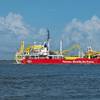Maersk 'BBB+' Ratings Put On CreditWatch Negative
• A.P. Moller – Maersk A/S (Maersk) recently announced its undertaking of a strategic and structural review of its business set-up.
• We understand that the disposal of one or several of Maersk's main business units could form part of the review's outcome, and we think that such a split would hurt the group's business diversification.
• We are therefore placing our 'BBB+' ratings on Maersk on CreditWatch negative.
• We aim to resolve the CreditWatch within the next three months.
STOCKHOLM (S&P Global Ratings) July 5, 2016--S&P Global Ratings today placed its 'BBB+' long-term counterparty credit rating on Denmark-based conglomerate A.P. Moller - Maersk A/S (Maersk) on CreditWatch with negative implications.
It also placed on CreditWatch negative the 'BBB+' issue ratings on Maersk's senior unsecured debt.
The CreditWatch placement follows Maersk's announcement that it will conduct a strategic and structural review of its business set-up. It is understood that this review could result in the disposal of one or several of Maersk's main business units, such as container shipping, exploration and production, drilling, or terminal. This split could hurt the group's business
diversification. Hence they currently apply a one-notch uplift to the rating on the group to incorporate their view of the group's broad diversification and strong positions in all its key business lines. That said, any material change to the group's structure could lead to a deterioration of the group's overall credit quality, in our view. Nevertheless, S&P acknowledges the large uncertainty around the outcome of the strategic review and that it may not result in any major changes. Furthermore, the extent of changes to the group's financial policy that the strategic review may imply, as well as any potential offsetting factors, are unclear.
Moreover, given that all business areas continue to face significant market difficulties, it is anticipated that Maersk's operating performance may falter. S&P projects that credit ratios will be low for the current rating for the full year 2016, including funds from operations (FFO) to debt around 25%-30%. The group's largest segment, the container liners, are experiencing severe freight-rate volatility and downward pressure on primary and secondary routes.
This trend has intensified over the past 12 months, and it is anticipated that performance in 2016 will drop significantly compared with 2015. Another deterrent, in our opinion, is that Maersk was unable to extend its profit sharing contract with Qatar Petroleum on the Al Shaeheen Field, implying that now build in a vast drop in Maersk's net entitlement production from
mid-2017, and with full effect from 2018 production level risk to be below 200 KOEPD. We recognize, however, that there will be no impact on Maersk's oil reserve profile.
The group's S&P Global Ratings-adjusted debt at year-end 2015 stood at $18.5 billion, down from $29.0 billion at year-end 2012.
While it is understood that the group plans to announce the progress of the strategic review in third-quarter 2016, it is believed it will take several months to implement any changes. Therefore, the assumtion that any changes are not likely to come into full effect until 2017.
Accordingly, it expects to assess the outcome of Maersk's strategic review and the impact on the group's credit profile within the next three months, at which time it will resolve the CreditWatch. S&P will discuss with management the outcome and possible implications, including the timing of any potential divestment and the impact on Maersk's free cash flow profile, financial policy, and credit metrics in the coming years.
If any of the main business units (container shipping, exploration and production, drilling, or terminal) are removed from the group, it would likely remove their positive diversification modifier, which would most likely lead to a one-notch downgrade. They will also monitor how the proceeds from any potential sale of a division will be used.
At the same time, a deterioration of the business risk profile to the lower spectrum of our satisfactory category--owing to the current tougher business environment--either in the form of a weaker competitive position or reduced diversification, could also constrain the ratings.
FFO to debt below 30% on a prolonged basis with limited likelihood of a near-term improvement would likely strain the rating. Furthermore, we would consider lowering the rating if it is observed there is a weakening in Maersk's competitive position.












